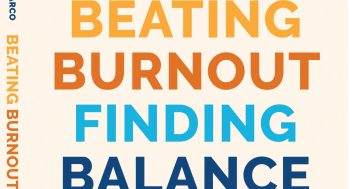
When you notice you’re making silly mistakes, forgetting important things, having outbursts of emotion, or making poor decisions, you’re likely burning out. Photo: glam.com.
In today’s highly competitive and increasingly volatile work environment, burnout is an ever-present danger. Travis Bradberry lists some of the warning signs and what you can do to counter them.
Even the best jobs can lead to burnout. The harder you work and the more motivated you are to succeed, the easier it is to get in over your head.
Burnout often results from a misalignment of input and output; you get burnt out when you feel like you’re putting more into your work than you’re getting out of it.
Sometimes this happens when a job isn’t rewarding, but more often than not it’s because you aren’t taking care of yourself.
Before you can treat and even prevent burnout, you need to recognise the warning signs so you’ll know when it’s time to take action. Here they are, in no particular order.
Health problems: Burnout has a massive, negative impact on your physical and mental health.
Whether you’re experiencing back pain, depression, heart disease or obesity, or you’re just getting sick a lot, you need to consider the role your work is playing in this.
Cognitive difficulties: Research shows that stress hammers the prefrontal cortex, the part of the brain responsible for executive function. This impacts your memory, decision-making abilities, emotional control, and focus.
When you notice you’re making silly mistakes, forgetting important things, having outbursts of emotion, or making poor decisions, you’re likely burning out.
Taking your work home: You know that sickening feeling when you’re lying in bed thinking about all the work you didn’t get done and hoping you didn’t miss something important?
When you can’t stop thinking about work at home, it’s a strong sign you’re burning out.
Fatigue: The hallmarks of burnout fatigue are waking up with no energy even after a good night’s sleep, and drinking large amounts of caffeine yet still having trouble staying awake at work.
Negativity: If you find yourself focusing on the downside of situations, judging others and feeling cynical, it’s clear negativity has taken hold and it’s time for you to do something about it.
Decreased satisfaction: Burnout almost always leads to a nagging sense of dissatisfaction.
Projects and people that used to get you excited no longer do so. This dip in satisfaction makes work very difficult, because no matter what you’re putting into your job, you don’t feel like you’re getting much out of it.
Losing your motivation: In a burnout state, you struggle to find the motivation to get the job done. You may complete tasks, and even complete them well, but the motivation that used to drive you is gone.
Instead of doing work for the sake of the work itself, your motivation stems from fear – of missing deadlines, letting people down, or getting fired.
Performance issues: People who burn out are often high achievers, so when their performance begins to slip, others don’t always notice.
It’s crucial to monitor your slippage. How were you performing a month ago? Six months ago? A year ago? If you see a dip in your performance, it’s time to determine whether burnout is behind it.
Poor self-care: Life is a constant struggle against the things that feel good momentarily but aren’t good for you.
When you experience burnout, your self-control wanes and you find yourself succumbing to temptations more easily.
This is largely due to the way that stress compromises your decision-making and self-control and also partially due to lower levels of confidence and motivation.
If you recognise many of these symptoms in yourself, don’t worry. Fighting burnout is a simple matter of self-care.
You need good ways to separate yourself from your work so that you can recharge and find balance. The following initiatives will help you accomplish this.
Disconnect: This is the most important burnout strategy, because if you can’t find time to remove yourself electronically from your work, you’ll never really leave work.
If taking the entire evening or weekend off from handling work emails and calls isn’t realistic, try designating specific times to check in on emails and respond to voicemails.
For example, on weekday evenings, you may check emails after dinner, and on the weekend, you may check your messages on Saturday afternoon while the kids are playing sport.
Scheduling such short blocks of time alleviates stress without sacrificing your availability.
Pay attention to your body signals: It’s easy to think that a headache is the result of dehydration, or a stomach ache is the result of something you ate, but that’s not always the case.
Burnout manifests in your body, so learn to pay attention to your body’s signals so you can nip burnout in the bud.
Schedule relaxation: It’s just as important to plan your relaxation time as it is to plan when you work.
Even scheduling something as simple as “read for 30 minutes” benefits you greatly.
Get organised: Much of the stress we experience on a daily basis doesn’t stem from having too much work; it’s from being too disorganised to handle the work effectively.
When you take the time to get organised, the load feels much more manageable.
Take regular breaks: Physiologically, we work best in spurts of an hour to an hour and a half, followed by 15-minute breaks.
If you wait until you feel tired to take a break, it’s too late – you’ve already missed the window of peak productivity and fatigued yourself unnecessarily in the process.
Keeping to a schedule ensures you work when you’re most productive and you rest during times that would otherwise be unproductive.
If these strategies don’t work for you, then the problem might be your job. The wrong job can cause burnout of itself.
In that case, you’ll have to decide what’s more important: your work or your health.
Travis Bradberry is the award-winning co-author of the bestselling book Emotional Intelligence 2.0, and the co-founder of TalentSmart. His books have been translated into 25 languages and are available in more than 150 countries. He can be contacted at TalentSmart.com. This article first appeared on the TalentSmart website.











